“G1 students’ English foundation is not secure. What if they can’t fully understand the lessons?”
“My child is a G3 student who just transferred from another school and is taught in full English immediately after entering Harrow. What if he can’t keep up with the curriculum?”
“The child’s English level is higher than that of his classmates. How can we help the child to make continuous progress?”
Since Harrow Haikou opened three years ago, the problems mentioned above are the most common concerns of parents in the Pre-Prep.

Read Write Inc (RWI) Phonics by Oxford University Press
This year, the Pre-Prep teaching team of AISL Harrow Haikou introduced the Read Write Inc (RWI) Phonics by Oxford University Press – a high-quality phonics programme designed to help children learn to read. The students are divided into eight levels and tagged by different colours – Red, Green, Pink, Purple, Orange, Yellow, Blue, and Grey – according to their English competence.
Each group will be managed and taught with an average adult-to-child ratio of approximately 1:8. This ensures that teachers can offer children high-quality, focused support which addresses their individual learning needs.
RWI Programme
The RWI Phonics programme was first published by Oxford University Press 25 years ago and has been widely adopted by nearly 5000 primary schools in the United Kingdom. First introduced to Hong Kong over a decade ago, this pioneering programme has been tried and tested over many years. And it is proven to be effective in helping non-native English speakers to achieve early success in reading.
The English Improvement course at Harrow Haikou adopts the RWI (Phonics) system. This comprehensive programme covers listening, speaking, reading and writing with 44 pure sounds to improve children’s English literacy and unleash their language potential. Our students will read a book every week written by Oxford University Press, and all these books contain the pronunciation and phonics of all the words they need to learn.


The RWI programme, based on synthetic phonics, is taught through differentiated grouping to support English learning in listening, speaking, reading, and writing. This ensures that our students can master the necessary skills of word recognition as early as possible at the Pre-Prep stage.
There are several features of the programme which we would like to share with you.
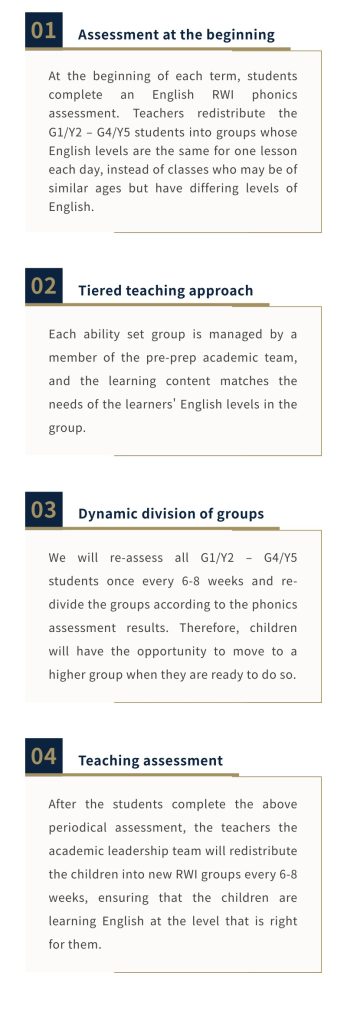
5 lessons in Phonics to help students read through a book in a week
As a bilingual school, we have been thinking about how to improve children’s English expression and application abilities quickly and effectively. Taking the RWI course of the Blue group as an example, we can look back on the five RWI Phonics lessons in one week delivered by Mr Mark Johnson, Deputy Head of Lower School (Academic)
Lesson 1
Word recognition based on pronunciation
Each RWI textbook has listed its key syllable that needs to be learned. For example, /ar/ is the key syllable of the book Barker for Blue group during the week.
Thus, in the book, we can see the words such as park/car/spark/shark/dark to help students to discover the spelling pattern.
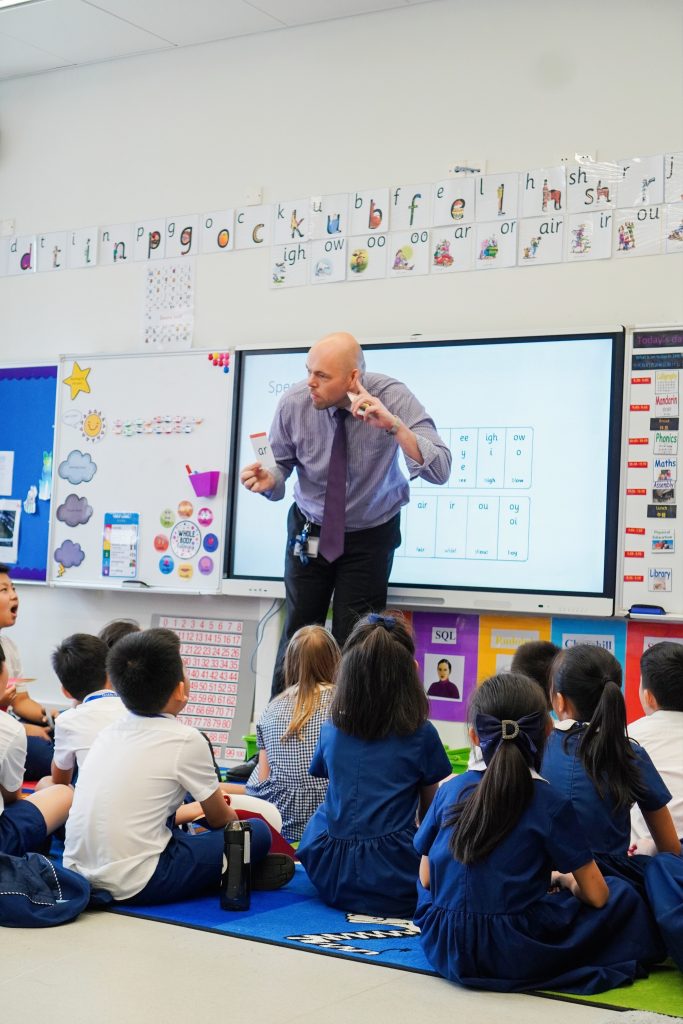
Phonics runs through every lesson.
Use your finger to count how many phonemes in a word.
What is the corresponding spelling for each syllable?
Mr Johnson reads the word P-ar-k in a very clear tone. When hearing 3 syllables, the children can quickly spell the correct word by following the method taught by the teacher. It helps the children to learn new words effectively.
Phonics instruction begins with teaching single letter-sound relationships.

Decoding is a related skill that requires the knowledge that there are specific sounds that correspond to certain letters or letter clusters. As children decode parts of words, they also need the ability to blend those sounds together to read written words. Mastery of these skills is crucial because they make up the foundation for learning to read and spell.
With this approach, students can learn lots of new words in a single lesson and enhance their efficiency in reading. That’s why the children can read through a whole book within 5 days.
Lesson 2
Pronunciation – words – sentences
After going over the pronunciation of /ar/ and related words, the teacher provided more challenging content!
Mr Johnson selected a few words that are used frequently and prepared the Green Word Cards. He also spent five minutes testing the children’s quick responses to these words that are useful for the story reading later.

Then each child in the group reads one page of the story of Barker. During this extensive reading stage, the teacher can quickly recognise any support the child needs in pronunciation, intonation, and word recognition.

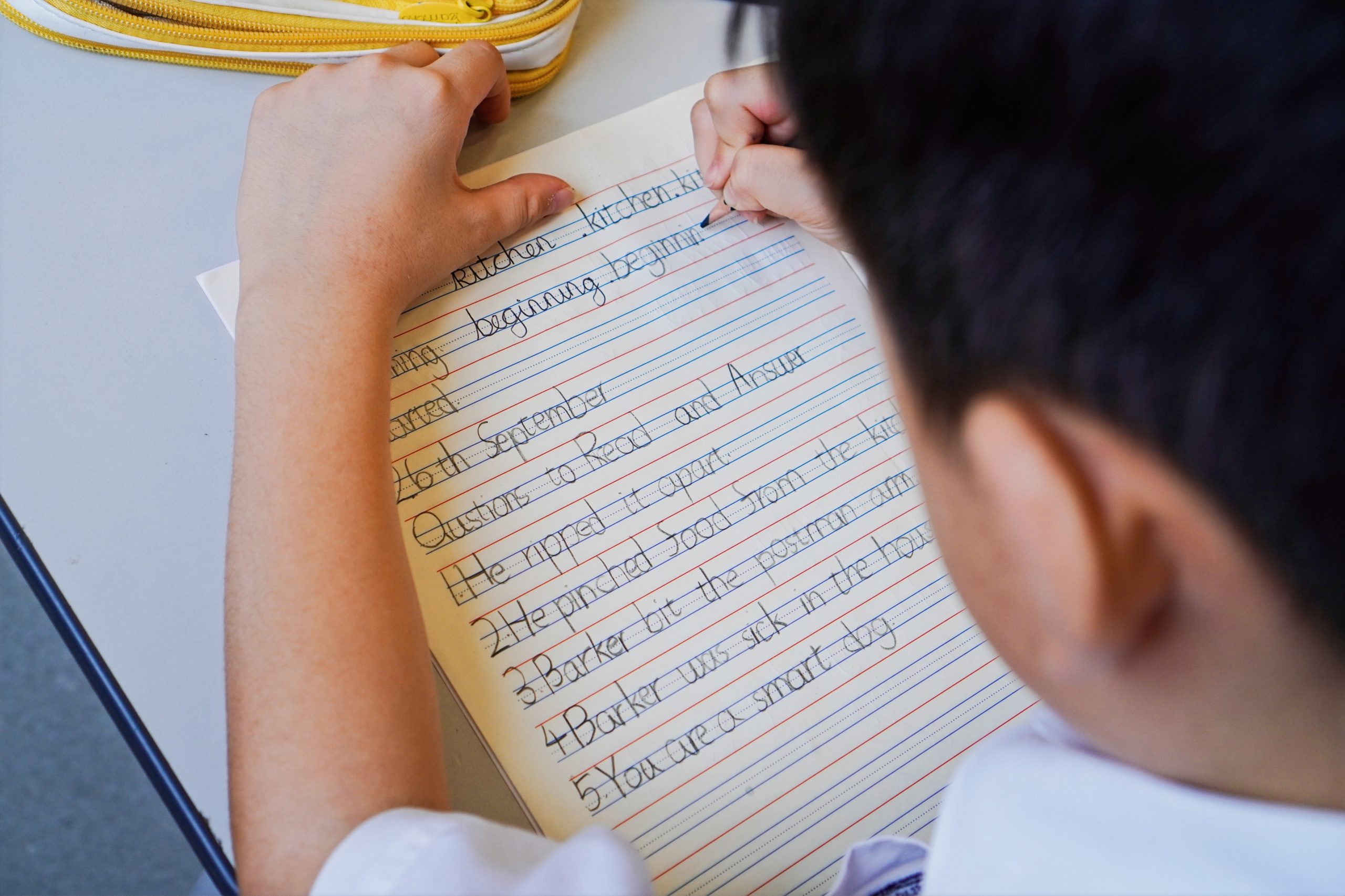
The teacher selects a long and difficult sentence from the RWI textbook. The teacher erases a word every time he reads it. In the case of missing words, most students can still remember the entire sentence. With this approach, students can remember and apply grammatical structures whilst enhancing their listening ability.
Then this sentence was written as a typical wrong one. And the student in the Blue group immediately discovered the mistakes:
“Mr Johnson, your initials are not capitalised!”
“You didn’t use the past tense!
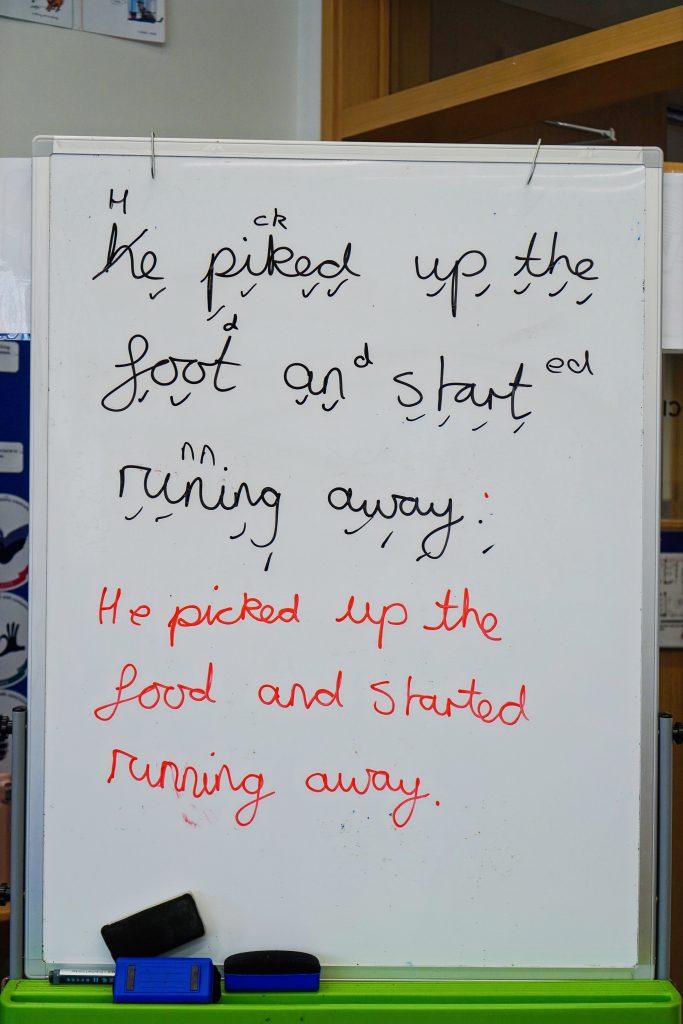
With this practice, students are enabled to engage in proofreading, and look at sentences critically. They continue to strengthen various abilities such as spelling, grammatical correction and correct use of punctuation marks, which are very effective for them in the final writing practice necessary skills that they will apply in each book’s associated writing task.
Lesson 3
Intensive reading
Lesson 3 focuses on intensive reading followed by reinforcement of previous learning.
Mr Johnson raises a few questions related to the details of the story and requires the children to find the answers from the story itself.

In this session, the teacher follows the ‘Three Reads’ method , which means the reader will have been through the text at least three times:
During the first reading, the children learn how to decode the words and remember the words through the spelling patterns.
During the second reading, the teacher ensures the children fully understand the text.
During the third reading, the children’s ability to storytelling will be developed.
Lesson 4
Using imagination when making sentences
How to make your sentences more interesting?
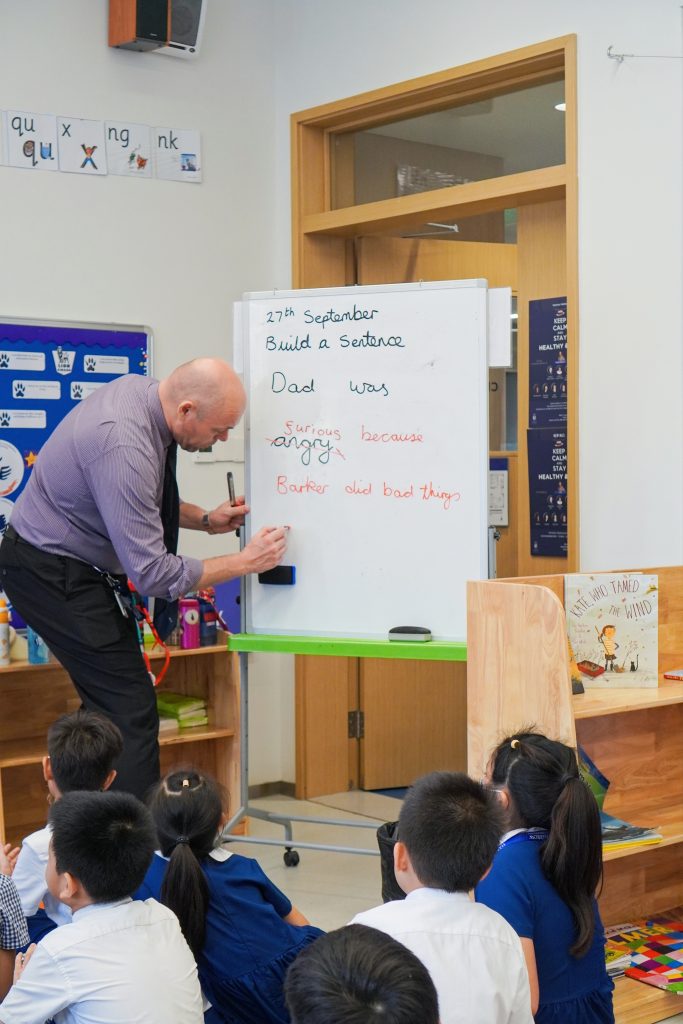
▲Build a sentence
Mr Johnson writes down a bland sentence:
Dad was angry.
Let’s look at the sentence revised by our students:
Dad was furious because Barker did bad things on Tuesday morning.
Angry is replaced with the more specific word furious and the reason why Dad was furious is added. And finally, temporal adverbial is added to make the sentence more complete. With these practices, children quickly learn the secrets to making sentences more interesting!
In addition, spelling correctly is of great significance too. To standardise the writing, the students tried their best to check each other’s grammar, spelling, and punctuation in their revised sentences.
Lesson 5
Writing practice
The final lesson of the week is given to writing and is an opportunity for the children to produce a written piece with scaffolded support.
Each RWI textbook has a corresponding writing practice. According to the storyline, Mr Johnson raises a few questions to help students recall the storyline and encourages them to use their own language to write down complete sentences to answer the questions.

For example:
What did Barker do to upset the family?
Not only did Barker…
But he also…
The students need to recall the story of the textbook by themselves and continue to finish the sentences or answer the questions with complete sentences.
Then they are required to check and correct spelling, punctuation, and grammar mistakes. Finally, the teacher will do the marking.

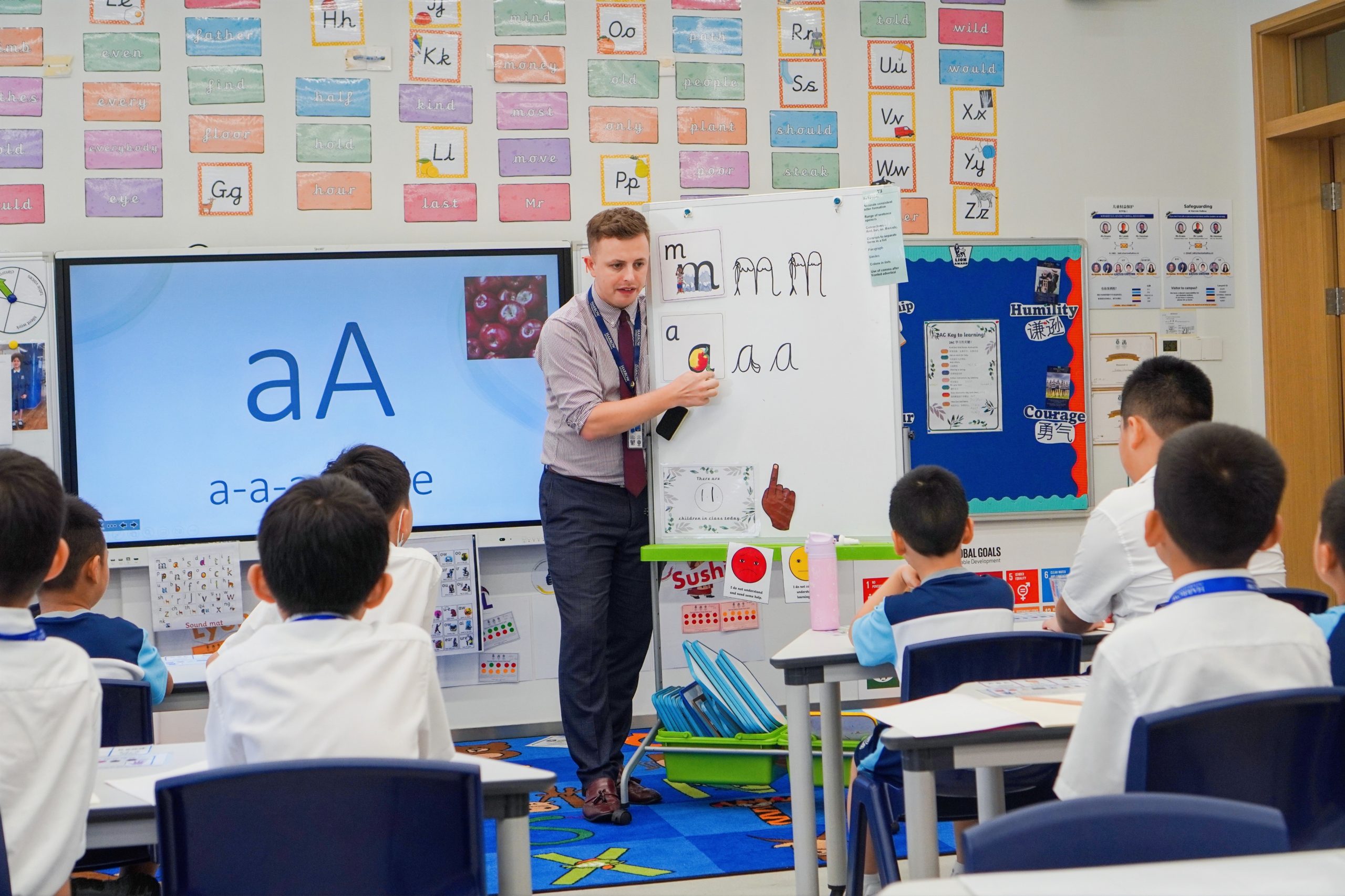
The stages of word recognition, spelling and sentence making are fully reflected in these 5 lessons in a week, which will support our children to improve their English level faster.
The school also regularly organises the Parent Partnership Programme to share with parents about the RWI programme, students’ learning progress and results at each stage, and how to give children more opportunities to practice at home. In this regard, Mr Johnson, and Ms Hayley also gave their suggestions:
Students may complete the optional English home learning tasks provided by teachers according to RWI programme requirements.
Students are encouraged to read every day, especially the RWI reading materials.
Parents can create an English listening environment at any time for the children.
At Harrow Haikou, language learning is only one part of the children’s journey of growth. We firmly believe that bilingual education is not to transplant the language of other countries but to learn and experience the collision and integration of different cultures. And our children can communicate with the wider world through language and become confident learners with bicultural backgrounds.








